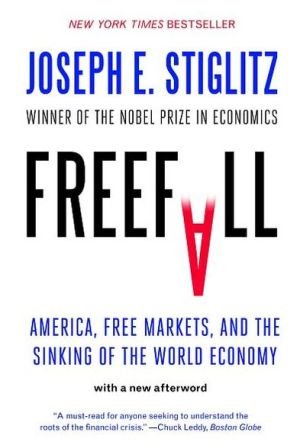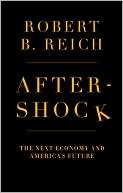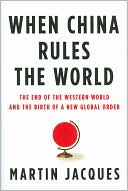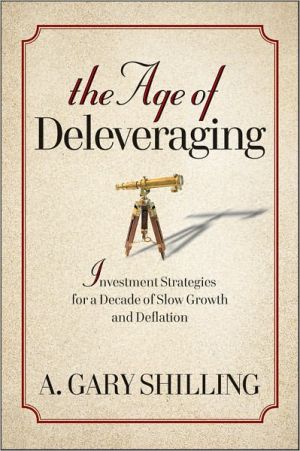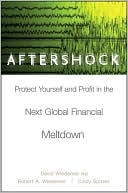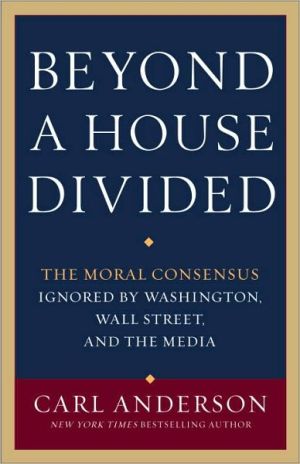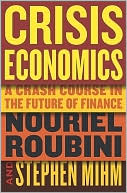Freefall: America, Free Markets, and the Sinking of the World Economy
The New York Times bestseller: "A lucid account" (New York Times) of the recent financial crisis and the way forward by the Nobel Prize-winning economist, with a new afterword.\ The Great Recession, as it has come to be called, has impacted more people worldwide than any crisis since the Great Depression. Flawed government policy and unscrupulous personal and corporate behavior in the United States created the current financial meltdown, which was exported across the globe with devastating...
Search in google:
An incisive look at the global economic crisis, our flawed response, and the implications for the world’s future prosperity. The New York Times - Kevin Phillips Freefall has three standout strengths. First, it is a powerful indictment of Wall Street, the United States financial sector and the Federal Reserve Board. Second, it offers a reluctant but persuasive elaboration of how the Obama administration decided to embrace the financial sector and the Fed, continuing and enlarging both the bailout and the too-big-to-fail philosophy that it inherited from George W. Bush. Finally, it is a blunt attack on Stiglitz's own profession, for transforming "scientific discipline" into "free-market capitalism's biggest cheerleader"…Stiglitz's virtue is that he minces few words.
Preface xiAcknowledgments xxviiChapter 1 The Making of a Crisis 1Chapter 2 Freefall and Its Aftermath 27Chapter 3 A Flawed Response 58Chapter 4 The Mortgage Scam 77Chapter 5 The Great American Robbery 109Chapter 6 Avarice Triumphs over Prudence 147Chapter 7 A New Capitalist Order 184Chapter 8 From Global Recovery to Global Prosperity 210Chapter 9 Reforming Economics 238Chapter 10 Toward a New Society 275Afterword 299Notes 345Index 417
\ Financial TimesThis is the best book so far on the financial crisis. Joseph Stiglitz . . . is knowledgeable about the historical background, immersed in the policy debate and a pioneer of the economic theories needed to understand the origins of the problems.\ \ \ \ \ Associated Press StaffAs a Nobel Prize winner, member of the cabinet under former President Bill Clinton and chairman of his Council of Economic Advisers, Joseph E. Stiglitz has some practical ideas on how to ease the pain of the Great Recession and maybe help prevent the next one.— Carl Hartman\ \ \ The New York TimesMr. Stiglitz uses his experience teaching to give the lay reader a lucid account of how overleveraged banks, a shoddy mortgage industry, predatory lending and unregulated trading contributed to the meltdown, and how, in his opinion, ill-conceived rescue efforts may have halted the freefall but have failed to grapple with more fundamental problems…. His prescience lends credibility to his trenchant analysis of the causes of the fiscal meltdown.— Michiko Kakutani\ \ \ \ \ The Times [London]Freefall is a spirited attack on Wall Street, the free market and the Washington consensus.— David Smith\ \ \ \ \ Boston GlobeAsks some basic and provocative questions… Freefall is a must-read for anyone seeking to understand the roots of the financial crisis. Stiglitz brilliantly analyzes the economic reasons behind the banking collapse, but he goes much further, digging down to the wrongheaded national faith in the power of free markets to regulate themselves and provide wealth for all.— Chuck Leddy\ \ \ \ \ Kevin PhillipsFreefall has three standout strengths. First, it is a powerful indictment of Wall Street, the United States financial sector and the Federal Reserve Board. Second, it offers a reluctant but persuasive elaboration of how the Obama administration decided to embrace the financial sector and the Fed, continuing and enlarging both the bailout and the too-big-to-fail philosophy that it inherited from George W. Bush. Finally, it is a blunt attack on Stiglitz's own profession, for transforming "scientific discipline" into "free-market capitalism's biggest cheerleader"…Stiglitz's virtue is that he minces few words.\ —The New York Times\ \ \ \ \ Publishers WeeklyDick Hill gives just the everyman kind of reading to make Nobel Prize-winning economist Stiglitz's analysis of the financial collapse plainly comprehensible and a ripping good—if enraging—yarn. With harsh words for the right and the left, Reagan-era deregulations that set the stage for the catastrophe, the Fed's bungling, the high costs of the Iraq War, and President Obama's refusal to take stronger measures, Stiglitz is passionate and iconoclastic. Hill handles the financial intricacies with clarity and delivers the material with warmth, urgency, and erudition. A Norton hardcover. (Feb.)\ \ \ \ \ BusinessWeekStiglitz offers a powerful account of the financial meltdown and criticizes the Obama Administration for 'muddling through' rather than pushing aggressively for change…. An excellent overview from a Nobel prize-winning economist of what caused the crisis and what reforms should be enacted…. I can only hope Obama makes room for it on his nightstand.— James Pressley\ \ \ \ \ From the Publisher"A useful and timely book.... It is a powerful indictment of Wall Street, the United States financial sector and the Federal Reserve Board." —-The New York Times\ \ \ \ \ The American ProspectStiglitz is the world's leading scholarly expert on market failure, and this crisis vindicates his life's work. There have been other broad-spectrum books on the genesis and dynamics of the collapse, but Freefall is the most comprehensive to date, grounded in both theory and factual detail…. the definitive critique to date of how the Summers-Geithner strategy fails, both as economics and as politics…. The tone of this book is good-humored and public-minded.— Robert Kuttner\ \ \ \ \ The Barnes & Noble ReviewFrom A. C. Grayling's "THE THINKING READ" column on Barnes & Noble Review\ One reason for the recent global economic meltdown, we are told, is that bankers did not understand the complicated financial instruments they had created; they did not know what they were packaging and trading. When they finally grasped that their greed had invented a load of toxic rubbish, they froze: mistrusting each other because they knew they were untrustworthy themselves, they refused each other and everyone else credit, and the world teetered on the brink. We the taxpayers have bailed them out, and they are now back to gobbling in the money-trough again, at our expense, as if they had learned nothing -- indeed as if nothing bad had happened.\ So: if the bankers themselves did not know what they were doing, if they did not know what offal they had created and nearly choked the world with, if they continue to be so stupefied by avarice that they cannot distinguish between securitized bad debt and tax aid so long as either keeps them in bonuses, to whom should we look for an explanation of what happened, what it says about the state of capitalism, and what should be done to put it right?\ Where else indeed but Joseph E. Stiglitz, the Nobel laureate professor at Columbia Business School with a stellar curriculum vitae: former Chief Economist at the World Bank, former Chairman of the President's Council of Economic Advisors at the White House, and the man asked by the United Nations to chair a panel of experts on the global meltdown's causes?\ The answer given by Stiglitz in his new book, Freefall, to "what went wrong" is, in sum, that the meltdown wascaused by a combination of greedy bankers, deregulation of the financial markets, and cheap money. Between them they created a bubble, in which vastly over-valued real estate funded unsustainable levels of consumption in the U.S. When (and the procession of outsize adjectives has to continue) huge financial institutions with huge bad debts found themselves slipping over the edge into de facto bankruptcy in 2008 as a result, the rest of the world went with them.\ Stiglitz's warnings about the dangers implicit in under-regulated financial markets are on public record, and for any number of years before the crash finally happened in 2008. At the 2007 World Economic Forum in Davos, when continuing world-wide growth seemed to rebut his Cassandra-like prognostications, he predicted that the delay in the crash's arrival only meant that it would be bigger when it came. Within months he had been proved right.\ His scepticism towards the piety that markets do better if left unregulated is not only vindicated beyond peradventure by the meltdown, but should have been shared by others. The evidence was clear for all to see: there have been 125 financial crises in various countries around the world since 1970 -- that is, in the era of growing deregulation mania -- whereas, in the quarter-century after 1945, economies were stable and flourished under sensible regulatory regimes adopted in response to the 1929 crash. With the debacle of 2008 as the capstone, these facts illustrate once and for all that the biggest single flaw in recent economic orthodoxy is the mantric belief that regulation interferes with the innate self-adjusting wisdom of markets.\ Regulation of financial markets is needed, Stiglitz argues, for the obvious reason that they are so intertwined with the rest of the economy that any misbehaviour in them is guaranteed to drag everything else (the "externalities") into trouble. "The bankers gave no thought to how dangerous some of the financial instruments were to the rest of us," Stiglitz writes. "The current failure has affected everyone: millions of homeowners have lost their homes, and millions more have seen the equity in their homes disappear; whole communities have been devastated; taxpayers have had to pick up the tab for the losses of the banks; and workers have lost their jobs. The costs have been borne [all] around the world, by billions."\ And Stiglitz describes the rescue of the banks by the taxpayer as "the Great American Robbery." He is withering in his attack both on the financial institutions and on the rescue packages provided to them by Bush and Obama alike. Together the packages amount to 80% of U.S. GDP, around $12 trillion: the sheer size is flabbergasting. Government acted as a garbage can for the banks' rubbish; it gave the banks zero-interest loans that the banks then re-lent at interest or gambled with; bankers and bank shareholders were rescued, but not individual homeowners and workers; and to add insult to injury, the government "provided that money," Stiglitz writes, "in non-transparent ways -- perhaps because it didn't want the public to be fully aware of the gifts that were being given, perhaps because many of those responsible were ex-bankers and non-transparency was their way of doing business."\ In part this last scornful remark refers to the tricks by which bankers hid bad debts in order to keep the rating agencies gold-plating the dodgy instruments they cooked up, and in part to the general ethos of private greed that caused public disaster. Early on, Stiglitz alludes to the distorting bonus-incentive culture of Wall Street as attracting "more than its fair share of the ethically challenged;" here he points out the magnificent irony of government refusing to regulate as it massively bailed out the banking system, on the grounds that doing so "would interfere with the workings of a free market economy." The only thing free about an economy in which banks are bailed out by taxpayers, is the ride given to the bankers.\ Stiglitz's disappointment, in particular, with Obama's failure to improve on Bush's efforts turns on the unfulfilled expectation that a Democratic administration would look first to the little guys being thrown out of their homes and jobs. Instead, by continuing with bank bail-outs rather than giving help to borrowers and employees, Obama's government has engaged in "privatizing gains and socialising losses."\ The examination Stiglitz subjects the crisis to is frank and unsparing, and he is not shy about naming names where he feels it is appropriate: Tim Geithner and Larry Summers, Obama's top economics men, come in for as much criticism as Alan Greenspan for the role he played during the Bush years. But the book is not all explanation and attribution of culpability. It also strongly argues a case for what should be done next. Foremost among the proposals is a fully global and transparent system of financial regulation that tackles such big problems as the incentive schemes which lead to undue risk-taking, gambling and short-termism, as well as the question of whether the world can continue to afford too-big-to-fail financial institutions.\ Although the G-20 as a collective body, and governments individually, have so far done too little to address these questions, says Stiglitz, doing so will eventually prove inevitable. "September 15, 2008, the date that Lehman Brothers collapsed, may be to market fundamentalism (the notion that unfettered markets, all by themselves, can ensure economic prosperity and growth) what the fall of the Berlin Wall was to communism. The problems with the ideology were known before that date, but afterward no one could really defend it." Market fundamentalism never served the poor well; now it has threatened hundreds of millions more with poverty, and cost the world economy dear. In Stiglitz's emphatic view a small adjustment to the system is not the answer. So far all that has happened, he says, is that to keep things from getting worse "we called in the plumbers who installed the plumbing" (and they have "overcharged us for the repair"). This does not seem to augur well for sufficiently radical reform; but it will have to come. And it must include breaking up those too-big-to-fail banks, curbing excesses of leverage, curbing outsized bonuses rewarding outsized risk, and putting an end to "over-the-counter derivatives."\ There has been a rash of books since the crisis began, but this one has the most distinguished author, the clearest prose, and the most authoritative and uncompromising take on matters. Stiglitz's prescriptions for the future are convincing, and everything he says is leavened by an admirable concern for the ordinary men and women who are the true victims of the bankers' greed and unaccountability, and the lack of protection afforded them by regulation. The fact that Stiglitz has for years been warning that the free-for-all financial system was heading for trouble adds weight and value to all he says. If one had to choose a single must-read about the great economic crisis of our times, this would be it.\ \ \ \ \
